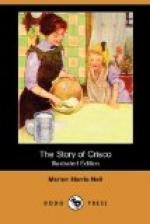Lean meat is made up of bundles of hollow fibres within which the albuminous juices are stored. Wherever these fibres are cut through, the juice oozes out and spreads itself over the surface of the meat. If, as in our first little experiment, the meat is put in cold water, or even in warm water, or exposed to a heat insufficient to set the albumen, either in an oven or before the fire, the albuminous juices are in the first case drawn out and dissolved, and in the second evaporated. In either case the meat is deprived of them. But if the meat is put into boiling water or into a quick oven or before a hot fire, the surface albumen is quickly set, forms a tough white coating which effectually plugs the ends of the cut fibres, and prevents any further escape of their contents.
Here, then, we have the first principles on which meat cookery must be conducted; viz: that if we wish to get the juices out of the meat, as for soups and stews, the liquid in which we put it must be cold to begin with; while if we wish, as for boiled or roast meat, to keep them in, the meat must be subjected first of all to the action of boiling water, a hot fire or a quick oven. The meats of soups and stews must not be raw, and that of joints must not be tough; and the cooking of both one and the other, however it is begun, should be completed at just such a moderate temperature as will set, but not harden, the albumen. That is to say, the soup or stew must be raised to this temperature, after the meat juices have been drawn out by a lower one, while a joint or fowl must be lowered to it after the surface albumen has been hardened by a higher one.
All poultry or game for roasting should be dredged with flour before and after trussing, to dry it perfectly, as otherwise it does not crisp and brown so well. Unless poultry is to be boiled or stewed it never should be washed or wet in any way as this renders the flesh sodden and the skin soft. Good wiping with clean cloths should be quite sufficient. With the exception of ducks and geese, all poultry and game require rather a large addition of fat during roasting, as the flesh is dry. Chickens will cook in from twenty to thirty minutes; fowls take from thirty to sixty minutes when young and tender, the only condition in which they are fit to roast; turkeys take from one to two hours and even more if exceptionally large. Game takes longer in proportion to its size than poultry, and all birds require better and more cooking than beef or mutton.
[Illustration]
Beef Collops
1 lb. hamburg steak 1 chopped onion 2 tablespoonfuls Crisco 1 cupful water or stock 1 tablespoonful flour Salt and pepper to taste 1 teaspoonful mushroom catsup or Worcestershire sauce Sippets of toast or croutons Mashed potatoes or plain boiled rice
Melt Crisco in saucepan, put in beef and onion and fry light brown, then sprinkle in flour, add water or stock, catsup or sauce, and seasonings. Cover pan and let contents simmer very gently forty-five minutes. Arrange collops on hot platter with border of sippets of toast or croutons, or border of hot mashed potatoes, or plain boiled rice.




